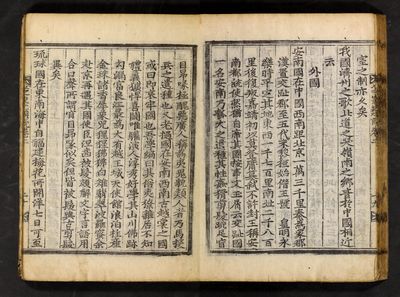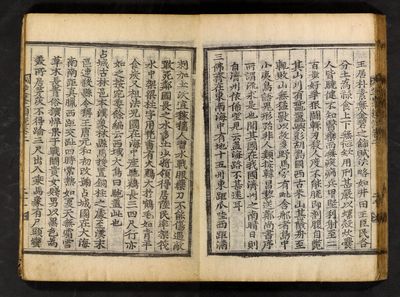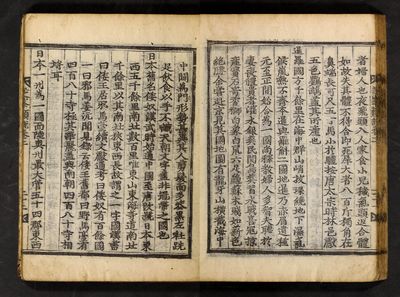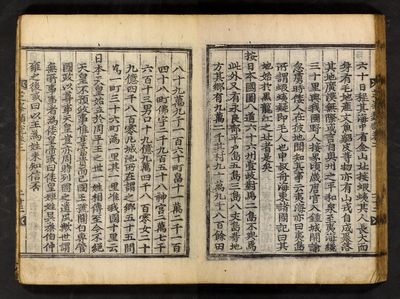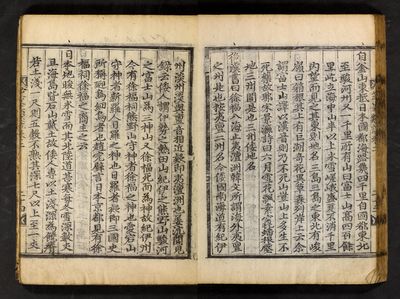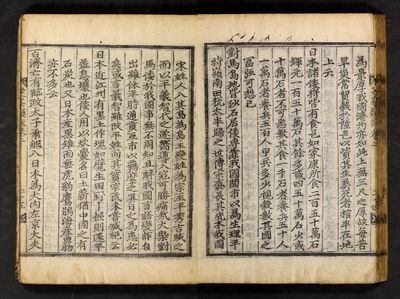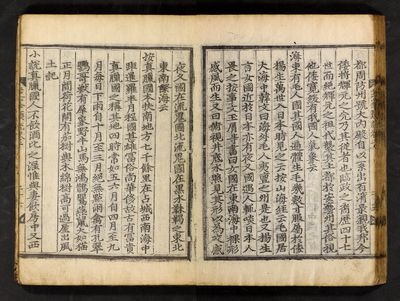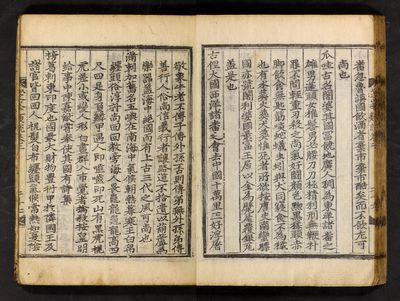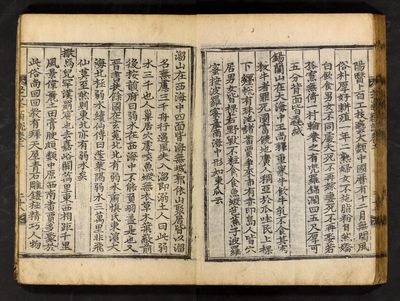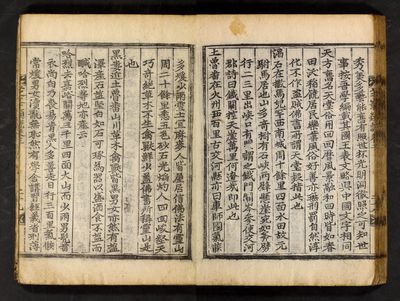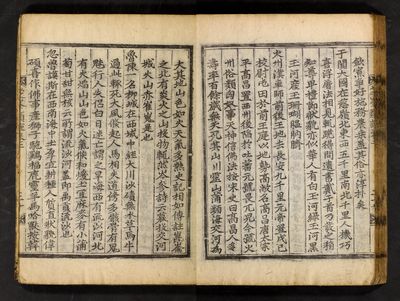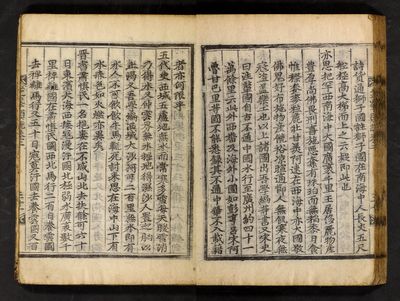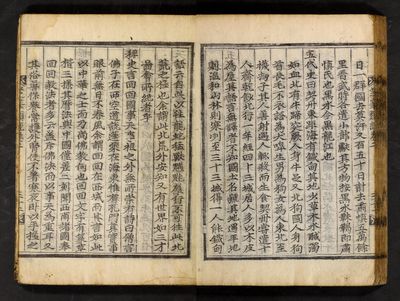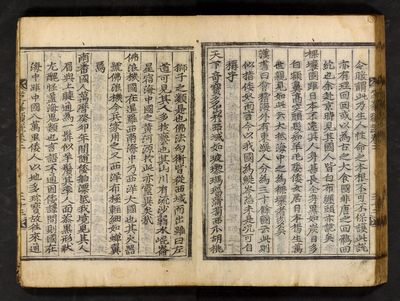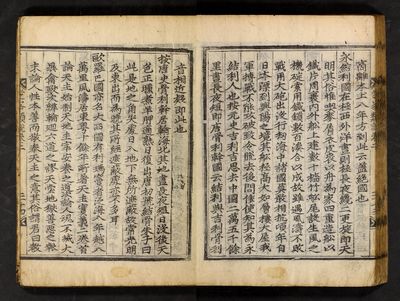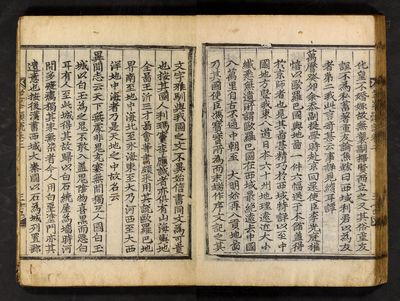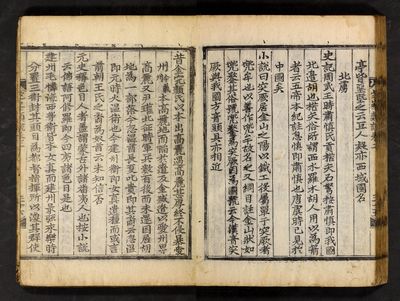(Translation) 李睟光 外國
| Primary Source | ||
|---|---|---|
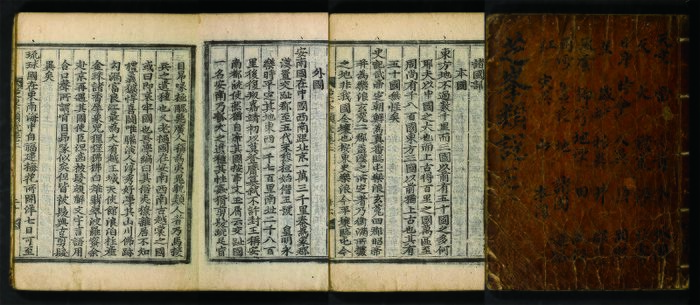 |
Title | |
| English | ||
| Chinese | 芝峯類說 | |
| Korean(RR) | 지봉유설(Jibongyuseol) | |
| Text Details | ||
| Genre | Royal Documents | |
| Type | ||
| Author(s) | 李睟光 | |
| Year | ||
| Source | ||
| Key Concepts | ||
| Translation Info | ||
| Translator(s) | Participants of 2018 Summer Hanmun Workshop (Advanced Translation Group) | |
| Editor(s) | ||
| Year | 2018 | |
목차
- 1 Introduction
- 2 Original Script
- 3 Discussion Questions
- 4 Further Readings
- 5 References
- 6 Translation
- 6.1 (sample) : Jaeyoon Song
- 6.2 Student 1 : Ren, Ruixin
- 6.3 Student 2 : (Write your name)
- 6.4 Student 3 : (Write your name)
- 6.5 Student 4 : (Write your name)
- 6.6 Student 5 : Inho Choi
- 6.7 Student 6 : Kanghun Ahn
- 6.8 Student 7 : King Kwong Wong
- 6.9 Student 8 : Younès M'Ghari
- 6.10 Student 9 : (Write your name)
- 6.11 Student 10 : (Write your name)
- 6.12 Student 11 : (Write your name)
- 6.13 Student 12 : (Write your name)
- 6.14 Student 13 : (Write your name)
- 6.15 Student 14 : (Write your name)
Introduction
Original Script
Discussion Questions
Further Readings
References
Translation
(sample) : Jaeyoon Song
- Discussion Questions:
Student 1 : Ren, Ruixin
1.安南國在中國西南。距北京一萬三千里。秦爲象郡。漢置交趾郡。至五代末。黎桓始僭王號。皇明永樂時。平定其地。東西一千七百里。南北二千八百里。後復叛。嘉靖初。以莫登庸纂弑。不許封王。稱安南都統使。然猶自帝其國。按事文玉屑云交趾國一名安南。乃瓠犬之遺種。其性姦猾。剪髮跣足。窅目昂喙。極醜惡。廣人稱爲夷鬼貌類人者。乃馬援兵之遺種也。
Annam is on the southwest of China, 13000 Li away from Beijing. It was a county named 象郡 in Qin dynasty. In Han dynasty, it was a county called 交趾郡. At the end of the time of five dynasties, 黎桓 firstly ascended the throne and ruled like a king. In Ming dynasty at the reign of Yongle, the rebellion was suppressed. The land of the area was 1700 li from the east to the west and 2800 li from the north to the south. It betrayed again later. At the beginning of the reign of Jiajing, 莫登庸 killed the king and usurped the throne. He was not allowed to be the king but called 安南都統使 instead. But he still made himself the king of the country. A book named 事文玉屑 said:交趾国,also named Annam, is the descendant of 瓠犬,the character of its people are cunning. They cut up their hair and walk on bare feet, they have deep eyes and bold mouth, the look of them is extremely ugly and evil. People who were called foreign devils with human looks by people in Guangdong and Guangxi provinces were descendants of the troops of Ma Yuan.
又老撾國在安南西南。古越裳之國。或曰卽哀牢國也。吾學編曰。其俗夷獠雜居。不知禮義。獷悍喜鬪。唯驩演人淳秀好學。其山川佛跡,句漏,富良江最爲大。有越王城,天使館,浪泊柱。産金,珠,諸,香,犀,象,兕,猩猩,狒狒,白雉,翡翠,波羅蜜,余赴京。再遇其國使臣。涅齒被髮。頗解文字。言語用合口聲。所謂窅目昂喙似矣。但皆被髮。與古剪髮異矣。 Laos lies on the southwest of Annam, it was called 越裳國 in ancient times, some also said it was 哀牢國. A book named 吾學編 recorded that different nations live together in this country. They do not behave according to rite and morality, they tend to be violent and aggressive. Only 驩演 people are unsophisticated and eager to learn more. The most impressive landscape is 句漏 and 富良江river. It has 越王城,天使館,浪泊柱. It produces gold, pearls, 诸, spicery,rhinoceros,elephants,兕,orangutans,baboon,silver pheasant,emerald,jackfruit. I went to the capital, met with their envoy again, he has black teeth and with disheveled hair, knows a lot about scripts and writing, speaking with joint tone. It is similar to deep eyes and bold mouth, but they all have disheveled hair, this is different from cutting hair in ancient times.
2. 琉球國在東南海中。自福建梅花所開洋。七日可至。王居朴素。無金碧之飾。賦法略如井田。王臣民各分土爲祿食。上下無征斂。用刑甚嚴。以螺殼炊爨。人皆驍健。不知醫藥而無疾病。兵甲堅利。射至二百步。好爭狼鬪。輒刃殺人。度不能脫。卽剖腹自斃。其山川有黿鼉嶼,彭胡島。國西古米山甚險。舟至輒敗。山無猛獸。以故多野馬。旁有毗舍那者。島中小夷。鳥語鬼形。殆非人類。按韓昌黎送鄭尚書序所謂流求是也。聞其國在我國濟州之南。晴日則自濟州依俙望見云。蓋海路不甚遠耳。
Ryukyu is in the southeast sea. Starting from 梅花所 in Fujian, it would take 7 days to get there. The king usually lives a simple life, decorate his place of living without gold and other decoration. Taxes and laws are similar to 井田法. King’s ministers receive lands as salary. There is no taxation from above, punishments to illegal acts are extremely rigorous. They use trumpet shell as cooking vessel. People here are strong and active, rarely use medicine and seldom get ill. Weapons and arms are solid and firm with a range of fire up to 200 bu. Violent and aggressive, kill people within seconds. If they think it's impossible to get out of trouble, they commit a suicide immediately. As to its landscape, there are 黿鼉 island, 彭胡島 island. 古米mountain in the west of the country is extremely abrupt, boats that reached near it always failed. It has no wild beast, so there live a large number of wild horses. 毗舍那 nearby is a small tribe one the island, they speak the language of birds and have an appearance like ghost, it seems they are not human. In 韓昌黎送鄭尚書序, it said that he had heard that Ryukyu is to the south of 济州. It can be seen sometimes when the weather is good. Generally, it should not be very far in the sea.
3. 三佛齊在東南海中。有地十五州。東距爪哇。西距滿剌加。土沃宜稼穡。人習水戰。服藥刀不能傷。遇敵敢死。隣國畏之。水多土少。將領得居陸。民率架筏。水中架梁柱。字用梵書。有火鷄大於鶴。毛如靑羊食炭。又祖法兒國在海中。産駞鷄長三四尺。行亦如之。按宛委餘編云西域大鳥曰駞。蓋此也。
三佛齊 is in the southeast sea, it has 15 districts. Java is on the east and Malacca is on the west. It has fertile lands that are suitable to farming. People in this country are quiet good at sea battle. They take a certain medicine so that sword can’t hurt them. They are dare to fight to death when come across enemy. Neighboring countries are frightened of them. Lands are limited, high-ranking generals can live on the dry land, ordinary people all live on raft, the set up pillars in the water. The characters they use are Sanskrit. There is turkey that bigger than crane. Their feathers similar with 青羊,feeding on coals. Besides, 法兒國 lies in the sea, 駞鷄 is a special animal in this country. The length of its body is up to 3 or 4 chi. 行亦如之. The book 宛委餘編 recorded that birds from western regions are called 駞, maybe this is what it has recorded.
4. 占城古林邑。本漢象林縣。馬援置銅柱之處。至漢末。區連殺縣令稱王。唐元和初。改號占城國。在大海南。南距眞臘。西距交趾。四時常熱如夏天。無霜雪。草木長靑。俗獷悍。果于戰鬪。貴女賤男。以黑色爲美。所居茅茨。不得踰三尺。出入乘馬象。有尸頭蠻"者。婦人也。夜飛頭入人家。食小兒穢氣。頭返合體如故。失其體不得合卽死。犀大者八百斤。獨角在鼻端。長可尺五寸。馬小於驢。按唐太宗時。林邑獻五色鸚鵡。蓋其所産也。
Champa was called Campa in ancient times, originally it was 象林县county in Han dynasty, where 马援 set up the copper pillar. Towards the end of Han dynasty, 區連 killed the magistrate and ruled as a king. At the beginning of the 元和reign in Tang dynasty, it changed it name to Champa. It lies in the south of the sea, Chenla is to the south of it. 交趾 is to the west of it. The four seasons in this country are hot like summer, no frost and snow here. Grass and trees are always green. People here are strong and aggressive, good at fighting and battles. Women are at a higher rank than men, regard black as the feature of beauty, the hutches they live in can not have a length longer than 3 chi. Every time they go out or come back, they ride horses or elephants. There are some people called 尸頭蠻, they are women. At night, they fly their head into people’s house, absorbing the 秽气 of the child. After that the head fly back to its body and fits the body like before. If the head lost its body and can not fit back to the body, it will immediately die. Big rhinoceros can weigh up to 800 jin. They have horns on the tips of its nose, with a length up to 1 chi 5 cun. Horses are smaller than donkeys. In the reign of emperor Tang Taizong, Campa presented parrots with five colors, that maybe the special production of the country.
- Discussion Questions:
Student 2 : (Write your name)
- Discussion Questions:
Student 3 : (Write your name)
9. 日本天皇。始立於周平王之世。一姓相傳。至今不絶。天皇不預政事。惟享富貴而已。國王號關白。專管國政。以尊事天皇。豈亦周時列國之遺風歟。世謂無所事事者。爲倭皇帝。或曰倭皇姬姓。吳泰伯仲雍之後。或曰以王爲姓。未知信否。"
The emperor of Japan started from the generation of King Ping of Zhou. They have continually inherited the throne within the same family so far. The emperor does not intervene in political affairs but merely enjoys riches and honor. The king who administers state affairs is called Kanpaku (關白), by which he shows reverence for the emperor. How could it be seen the same custom left by the Zhou dynasty? What people say "idling around" is exact the emperor of Japan. Someone says the surname of the emperor of Japan is Ji, (implying that) they are the descendants of Botai1 and Zhongyong2 of Wu3. Someone says their family name is Wang, which is doubtful.
10. 自釜山東抵日本國都。海路幾四千里。自國都東北至駿河州。又一千里。所有山曰富士山。高四百餘里。屹立海中。山半以上。冰雪嵯峨。盛夏不消。千里內望而見之。其東則地名三島。三島之東北。有峻嶺曰箱根。其上有巨湖。奇花異草森列岸上云。余謂富士山。譯以漢音。則乃不死山。豈山上多生不死藥故耶。宋景濂詩曰六月雪花飄素竁。蟠根壓地三州間是也。三州。倭地名。
Traveling from Pusan to the capital of Japan approximately crosses 4,000 li by sea. What distances 1,000 li away from Suruga, which located northeast to the capital, is a mountain called Fuji.
11. 後漢書曰。徐福入海。止夷澶洲。韓文所謂海外夷亶之州是也。按夷亶二州名。今倭國南海道。有紀伊州淡州。淡與亶音相近。疑卽夷澶洲也。姜沆聞見錄云倭人謂伊勢之熱田山。紀伊之熊野山。駿河之富士山。爲三神山。又徐福死而爲神。故紀伊州。今有徐福祠。熊野山守神者。徐福之神也。愛宕山守神者。新羅人日羅之神也。日羅者。疑卽三國史所稱迎烏,細烏者也。趙完璧言日本京都。見有徐福祠。徐福之裔主之云。
12. 日本地暖無冰雪。而其北陸道甚寒。每冬雪深數丈。且海島皆石山戴土。故倭人專以土淺深爲饒瘠。若土淺一尺。則五穀不熟。其深七尺以上至一丈"爲最厚。我國濟州亦如此。土無三尺之厚。故每苦旱災。常貿穀於陸邑。以資其生。葬死者。棺半在地上云。
1 泰伯 was the eldest son of King Tai of Zhou and the legendary founder of the State of Wu. His ancestral name was Ji.
2 仲雍 was the second ruler of the ancient Chinese State of Wu according to traditional Chinese history.
3 Wu was one of the states during the Western Zhou Dynasty and the Spring and Autumn period. It was also known as Gouwu (勾吳) or Gongwu (工吳).
- Discussion Questions:
Student 4 : (Write your name)
- Discussion Questions:
Student 5 : Inho Choi
- Translations
17. 海東有毛人國。其國人遍體生毛幾數寸。服屬於倭。楊生萬世入日本時見之云。按山海經云毛國居大海中。韓文曰海外毛人夷亶之州是也。又楊生言女國近於日本。亦有夜叉國。遇人輒啖。日本人畏之。按事文玉屑等書曰。女國在東南海中。裸形感風而生。又曰俯視井底水。照見其形。以爲交感。夜叉國在流鬼國北。流鬼國在黑水靺鞨之東北。東南際海云。 On the east of the sea(ocean?), there is the country of hairy people. Its people have hair all over their body which 'reaches' a few Chon. They submit to the Japanese. Yangsaeng of 10000 generations said he saw it when entering Japan. According Classic of Mountains and Seas, The Country of Hairy people is in the middle of the sea. This is what Hanwen called as the Hairy people's land(island?) of Idan on the outskirt of the ocean. Also, Yangsaeng told that the country of women is close to Japan and that there is the country of beasts, and the Japanese was afraid of it. According to what Samunokseol(Samunoksŏl) and others wrote, the country of women is in the southeast sea, and they are naked and are born by contracting the wind-force(?). Also, it is said they communicate by illuminating their figures as they crouch upon a well(hard to tell its meaning). The country of beasts is in the north of the country of Yugwi(Sakhalin). The country of Yugwi is in the northeast of Malgal of the Black Water tribe. It reaches the sea on the east and the south(This is all said by Samunokseol).
18. 按眞臘國本扶南。地方七千餘里。在占城西南海中。距暹羅半月程。國甚雄富。俗尚華侈。故古有富貴眞臘國之稱。其地四時常如五六月。自四月至九月。每日下雨。自十月至三月。絶無點雨。禽有孔翠鸚哥。獸有犀象野牛山馬。無鴻鵲鶯燕。鼠大如猫。正月間荷花開。有茄樹與木綿樹。高可過屋。出風土記。
On(what is the function of 按) the country of Chenla(Khmer), it was originally Funan. Its land is about 70 square li(70li*70li), and it is in Champa's Southwest sea. It is half month away(a measure of distance) from Siam(Thailand). The country is remarkably expansive and rich. The custom values luxury. Thus, since the ancient times, it has the name of rich country of Chenla. Its land's climate is for all seasons like the fifth-sixth month. From the fourth month to the ninth month, it rains everyday. From the 10th month to the third month, there is absolutely no rain. As to the types of birds, it has peacock and parrot. As to the land animals, it has rhino, elephant, buffalo, and mountain horse. There is no wild goose, magpie, nightingale, and swallow. Rats are as big as cats. Throughout the first month, lotus flowers blooms. It has eggplant and cotton tree. Their height can reach beyond the height of houses. These facts appears in the Record of Wind and Soil.
19. 小說。眞臘國人。不飮酒比之淫。惟與妻飮房中。又西番忽魯謨國。飮酒者棄市。棄市酷矣。而不飮。尤可尚也。 According to the stories, people of Chenla do not drink. They liken drinking to the amorous matters. Only with wife, they drink in the room. Also, in the Western foreigner, the country of Hollomo(Ormuz?), they punished those who drink by abandoning their corpse in the marketplace. Although abandoning the corpse in the market is severe, as to not-drinking, it can be on the contrary praised.
20. 爪哇。古名闍婆其國富饒。地廣人稠。爲東洋諸番之雄。男蓬頭女椎髻。男必腰刀。刀極精利。刑無鞭朴。罪不問輕重。刃殺之。尚氣好鬪。顔色黝黑。猱頭赤脚。飮食無匙筯。啖蛇蟻蟲蚓。與犬同寢食。不爲穢也。有水葬火葬犬葬。惟死者所欲。按唐史。南蠻驃國。亦號闍利婆。國最富, 王居以金爲甓,屋覆銀瓦蓋, 是也。 On Java, its old name was Saba. The country is rich. Its land is expansive, and its people numerous. It is the major figure among the various foreign country in the East Ocean(東洋 is this proper noun?). Men keep unkempt hair, and women keep the topknot style. Men must carry sword on their waist, and the sword is extremely refined and sharp. As to the punishment, there is no punishment by whipping or beating. Regardless of the weights of crimes, they kill the convicted by sword. They values vigor and likes fighting. Their facial color is dark. They have monkey-like head(what is this?) and are barefoot. As to eating, they have no spoon and chopsticks. They chew up ants, snakes, bugs and worms. They sleep and eat with their dogs and do not consider it as being dirty. They practice burial by water, cremation, and burial by dogs and follows that which the dead desires. According to the History of Tang, the Southern barbarian, the country of the Pyu(1), is also called Sarip'a(Seriva?). The country is the extremely rich. In the King's residence, the wall is made of gold. As to the house, they put silver roof tiles. This is the country.
(1) https://baike.baidu.com/item/%E9%AA%A0%E5%9B%BD/7382171
- Discussion Questions:
Student 6 : Kanghun Ahn
- Translations:
24. 錫蘭山在大海中。王尚釋重象牛。飮牛乳不食其肉。殺牛者罪死。國富饒。地廣人稠。亞於爪哇。民上裸下纏帨。有珠池。諸番賈爭來市。有赤印島。人皆穴居。男女皆裸若野獸。不粒食。食魚蝦芭蕉子波羅蜜。按波羅蜜産南海中。形如東瓜云。
Ceylon (Sri Lanka) exists in the middle of the sea. Its kings venerate the Shakyamuni Buddha, and cherish elephants and cows. They drink milk, and do not eat beef. Those who kill cows are to be punished with execution. The country is opulent. Its land is vast, and has a large population, which is comparable to Java. They do not wear tops, and wind their bottoms with towels. There is a place where beads are abundant, so merchants there compete with each other, while forming a market nearby. There is an island called 赤人島, where people live in caves. Both men and women are naked like beasts. They do not eat grains. They instead eat fish, toads, plantains, and jackfruits. As for Jackfruits, they grow in the middle of the southern sea. It is said that they look like gourds.
25. 溜山在西海中。四面皆海。無城郭。依山聚居。皆以溜名。無慮三千。舟行遇風失入溜卽溺。土人曰此弱水三千也。人巢居穴處。啖魚蝦. 無衣草木葉蔽前後。按韻府曰。弱水在西海中。不能負羽。蓋是也。又晉書。扶餘國在玄菟北。北有弱水。肅愼氏東濱大海。北極弱水。續仙傳曰。蓬萊隔弱水三萬里。非飛仙莫至。然則東北亦有弱水矣。
Liushan exists in the middle of the west sea. Its four sides are surrounded by the sea, so there are no fortifications. They gather and reside, relying on mountains. There are about three thousand places called “liu”. When boats encounter the wind, they lose their way, drift, and eventually sink. Its natives call it "three thousand lis of Ruoshui". People there make nests (and live there) or reside in caves, and eat fish and toads. They do not wear clothes, and cover their front and back with grass, trees and leaves. As I think about it, the book "Yunfu" states as follows: “Ruoshui exists in the middle of the west sea, and is not even capable of making a feather float.” So this is what it is. Also, the History of Jin says that the Puyo state is to the north of Xuantu. In the north, there was the Ruoshui, where the Sushen family reached all the way to the east of the great sea, and all the way to the north, which is the Ruoshui. The Xuxianzhuan (Sequel of the Biography of the Hermits) says that the Penglai blocks the way towards the three thousand lis of the Ruoshui, so one cannot get there, unless he is a flying hermit. Hence, there is also the Ruoshui to the northeast thereof.
26. 撒馬兒罕。漢罽賓也。去嘉峪關萬里。東西相距千里。風景偉麗。土田膏腴。頗類中原。西南番賈多聚於此。俗尚回回敎。有拜天屋。靑石雕鏤極精巧。人物秀美多藝能。舊有照世杯。光明洞徹。照之可知世事。按吾學編。載其國王表文。略與中國文字相同。
Samarkand was Kashmir during the Han period, and was a thousand lis apart from the Jiayu Guan. Its width (to the east and the west) is one thousand lis. Its scenery is vast and beautiful. Its land is fertile, which is pretty similar to the center of China. A lot of merchants of the Xinanpan gathered here. People are Muslims. They have their venues to venerate the heaven, which are decorated with blue stones in a very sophisticated fashion. Its people are superb, beautiful, and versatile. Back in the day, there was so-called Zhaoshibei, and its light was so vastly illuminating as to shine the whole world. As I think about it, the Wuxuebian contains the royal writings of its kings, and their letters seem to resemble those of China.
27. 天方。舊名天堂。俗用回回曆。風景融和。四時皆如春。田沃稻饒。居民樂業。風俗好善。亦無刑罰。自然淳化。不作盜賊。佛書所謂天堂。疑指此也。
Tianfang used to be called Tiantang. Its people used the Islamic calender. It had a harmonious scenery. Its four seasons are like spring. Its land is fertile, and its grains are abundant. People there delightedly work. Its customs comply with virtues, so there were no punishments, and people were naturally cultivated. They did not commit burglary, so it seems (at least doubtedly) to be what the Buddhist texts call the heaven.
- Discussion Questions:
Student 7 : King Kwong Wong
- Translations:
21. 古俚大國。西洋諸番之會。去中國十萬里。王好浮屠。敬象牛。老不傳子。傳外孫。否則傳弟。無外孫弟。傳善行人。俗尚信義。行者讓路。道不拾遺。以葫蘆爲樂器。蓋海中絶國。而有上古三代之風。可尚也。
22. 滿剌加。舊名五嶼。在南海中。氣候朝熱暮寒。王白帛纏頭。俗淳朴。尚回回敎。旁海人畏龜龍。龜龍高四尺四足。身負鱗甲。遇人卽嚙。嚙卽死。山有黑虎。視虎差小。或變人形。白晝群入市。覺者擒殺。按皇明給事中陳嘉猷。嘗奉使其國。有詩集。
23. 榜葛剌。東印度也。國最大。財物豐衍。甲於隣國。王及諸官。皆回回人。祝髮白布纏頭。氣候常熱如夏。陰陽醫卜百工技藝。大類中國。曆有十二月無閏。風俗朴厚。好耕殖。一年二熟。婦女不施脂粉。自然嬌白。飮食。男女不同處。夫死不再嫁。妻死不再娶。若孤寡無倚。一村輪養之。有兜羅錦。闊四五尺。厚可五分。背面皆毳絨。
25. 溜山在西海中。四面皆海。無城郭。依山聚居。皆以溜名。無慮三千。舟行遇風失入溜卽溺。土人曰此弱水三千也。人巢居穴處。啖魚蝦無衣。草木葉蔽前後。按韻府曰。弱水在西海中。不能負羽。蓋是也。又晉書。扶餘國在玄菟北。北有弱水。肅愼氏東濱大海。北極弱水。續仙傳曰。蓬萊隔弱水三萬里。非飛仙莫至。然則東北亦有弱水矣。
26. 撒馬兒罕。漢罽賓也。去嘉峪關萬里。東西相距千里。風景偉麗。土田膏腴。頗類中原。西南番賈多聚於此。俗尚回回敎。有拜天屋。靑石雕鏤極精巧。人物秀美多藝能。舊有照世杯。光明洞徹。照之可知世事。按吾學編。載其國王表文。略與中國文字相同。
27. 天方。舊名天堂。俗用回回曆。風景融和。四時皆如春。田沃稻饒。居民樂業。風俗好善。亦無刑罰。自然淳化。不作盜賊。佛書所謂天堂。疑指此也。
28. 渴石。在撒馬兒罕西南。城周十餘里。四面水田。故元駙馬居也。山多奇樹。有石峽。兩壁懸崖。宛如斧劈。行二三里。出峽口有門。謂之鐵門關。岑參使交河郡詩曰。鐵關控天崖。萬里何遼哉。卽此也。 Kalsŏk [RR: Galseok](nowadays Shakhrisabz in Uzbekistan), in the Southwest of Samarkand. The circumference of the city is more than ten ri. Its four sides are surrounded by paddy fields. It was the residence of an imperial son-in-law of the Yuan in the past (refers to Tamerlane). Its mountains have many strange trees. It has a rocky gorge. As to the cliffs of its two sides, it resembles the cleavage from an axe. From there walk two to three ri, after exiting the gorge, is a gate, which is called the Iron Gate Pass. In the poem "Envoy to Jiaohe County" (Gaochang) Cen Can says, "The Iron Pass controls the end of the world, how far is ten thousand li? This namely is the Iron Gate Pass.
- Discussion Questions:
Student 8 : Younès M'Ghari
- Translations:
29. 土魯番。在火州西百里。古交河縣。亦曰車師國。氣候多煖少雨雪。土宜麻麥。人皆屋居信佛法。有靈山周二十餘里。悉五色砂石。光焰灼火。四回峻壑。天巧奇絶。草木不生。禽獸鮮少。蓋佛書所稱靈山是也。
Turpan1 is 100 li away in the West from Huozhou2. It belongs to the ancient 틀:Jiaohe4. It is also called the Jushi Kingdom5. Its climate is very warm and it rarely rains or snows. The local products are sesame and wheat. People [there] all live in houses and believe in Buddhism. The area extends over more than 20 li. The whole five colors6 are sand and stones. The light flare, the fire burns. There are four deep gullies. The sky is incredibly wonderful.7 The grass and trees do not grow. The birds and beasts are very few. There are Buddhist scripts praising the spirits in the mountain.
30. 黑婁。近土魯番。山川草木禽獸皆黑。男女亦然。有鹽澤産石鹽。堅白如石。可琢爲器。以盛酒食。不鹽而鹹。哈烈等地亦産云。
Heilou8 is close to Turpan. The mountains, rivers, grass, trees, birds, beasts are all dark. Men and women are too. There are salt ponds that produce rock salt. It is solid and white like stones. It can be cut to serve as a tool to drink and eat. It takes [humidity]9 in and is salty. In Herat10 and other places it is also produced in this way.
31. 哈烈。去嘉峪關萬三千里。四面大山而少雨。男髡首。衣尚白。乃喪易靑黑。人多善走。日行三百里。氣候常煖。男女瀆亂無恥。然有學舍。講習經義。省刑薄斂。寡爭好施。務農桑。蓋其俗亦淳朴矣。
Herat is at 13000 li, starting from the Jiayu Pass11. There are big mountains in the four directions and it rarely rains. Men shave their head, dress 틀:向 (dress always in white? used to dress in white?) in white and so they lost the blue and the black. People are very mbbile, [they] walk 300 li a day. The climate is often warm. Men and women are rude, turbulent and shameless. If there were schools, if they received instruction and appropriated the intentions of the Classics, they would dimunish the [number of] penalties and lighten the [weight of the] taxes, they would less fight and good at working, they would deal with agriculture and sericulture. Their customs would probably also be simple and honest.
32. 于闐大國。在葱嶺北。東西五千里。南北千里。人機巧。喜浮屠法。相見輒跪。得問遺書。戴于首乃發之。稍知尊卑禮節。狀貌亦似華人。有白玉河,綠玉河,黑玉河。産玉珊瑚膃肭臍。
Yutian12 is a large kingdom. It is at the North of Congling. There are 5000 li from the East to the West and 1000 li from the South to the North. People [there] are 틀:Relatively clever. They celebrate Buddha's dharma. When they meet 틀:The Buddha together? each other?, they often kneel.
1 土魯番: sinitic name of Turpan, a city located in modern Xinjiang, China, written as 吐鲁番 in Contemporary Mandarin Chinese (pinyin: Tǔlǔfān; Uyghur: تورپان).
2 火州: one of the designations of the city 高昌 (pinyin: Gāochāng; Uyghur: قاراغوجا) during the Yuan and Ming dynasties.
3 交河: 틀:One of the regions of China located at the East of Beijing.
4 縣: translating this word 'county' as in Mandarin Chinese may pose the problem of its important size.
5 車師: the Jushi (pinyin: Jūshī), or Gushi (Mandarin: 姑師; pinyin: Gūshī), were a people who established a kingdom during the 1st millennium BCE in the Turpan basin.
6 五色: it can be metaphorically understood here as 'the environment' or 'the view'.
7 Interestingly, this passage looks familiar to the one of the 历代兴衰演义, written about a century later by Lǚ Fǔ (吕撫): "群山悉五色,砂石光焰灼人,峻壑穷崖,天巧奇绝。"
8 I could not find a place name that would correspond to this city today.
9 The author might also be thinking of salt as only an 'ingredient' absorbing liquids and sauces.
10 哈烈: ancient sinitic designation for the city Herat in Afghanistan (Persian and Pashto: هرات); in 1413, the sovereign Shah Rukh Mirza of the Timurid empire (r. 1404-1447) sends the emperor Yongle of the Ming (r. 1402-1424) a tribute; the same year, the latter sends a delegation to Herat. This is probably how the author came to know about Herat.
11 嘉峪關: the Jiayu Pass (pinyin: Jiāyù Guān) is the first frontier fortress at the west end of the Ming dynasty Great Wall of China, in modern Gansu, China.
12 于闐: from the Han dynasty until at least the Tang dynasty, the ancient Iranic Saka Buddhist kingdom of Khotan (56-1006) was was known in Chinese as Yutian (于闐, 于窴, or 於闐; pinyin: Yútián).
- Discussion Questions:
Student 9 : (Write your name)
- Discussion Questions:
Student 10 : (Write your name)
- Discussion Questions:
Student 11 : (Write your name)
- Discussion Questions:
Student 12 : (Write your name)
- Discussion Questions:
Student 13 : (Write your name)
- Discussion Questions:
Student 14 : (Write your name)
- Discussion Questions:
